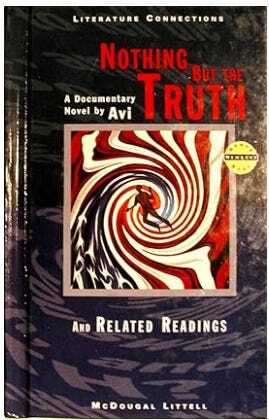One hidden libertarian message shines in Avi's Nothing but the Truth

If you asked me about my fondest memories in government school, literally from 1995 to 2009, I’d respond with, “I have few. Very few.” One of those few fond memories, however, came with books that we read in English (also known as Language Arts) class.
The Libertarian Book Reviewer is a reader-supported publication. To receive new posts and support my work, consider becoming a free or paid subscriber.
When I was in the eighth grade, we read Nothing but the Truth by Avi while our teacher sat behind the desk to continually fulfill their online poker addiction. And yeah, you read that right; they played poker while we read Nothing but the Truth aloud.
But it was actually kind of enjoyable, since, given the way Avi wrote the book, it contained a ‘documentary’ flair. And while I got one powerful memory, I can’t, for the life of me, remember who I “portrayed.”
Anyway, it doesn’t matter. Instead, I added the book to my TBR list as part of that New Year’s Resolution I mentioned about a month ago. Remember it? And I really wanted to include this hidden gem of a classic because its subject matter might make parents think twice about government schooling….plus other tidbits, but that’s not the focus of today’s discussion.
Let’s dive in.
One-Size, Don’t Fit All TeachersThe book’s centered around two main characters, Philip Malloy and Margaret Narwin. While Philip is the protagonist and Narwin is the antagonist, this book is intended for the reader to feel contempt for Philip and sympathy for Narwin.
But I don’t, and neither would any real critical thinker. Now, Narwin’s not a bad person, she’s an outstanding teacher, and plenty of students love her class, including Philip’s crush, Allison Dorsett.
The kicker? Philip can’t stand Narwin and while Narwin shows sympathy for Philip, he’s just not a good fit in her class. Now, don’t get me wrong, Philip’s not making much of an effort in Narwin’s class, and when he later has her for homeroom as well, he acts out. More on that later.
No, Philip’s not making his situation any better, but it’s clear that Narwin’s not a good fit for him, period. And as much as Philip pleads to the assistant principal, Dr. Joseph Palleni, to withdraw from Narwin’s class, he won’t concede to Philip’s wishes.
It’s also noted that Philip is an above-average student in his other classes, and he shows a knack for mathematics. So it’s not like he’s a deadbeat. But if a teacher ain’t a good fit, yet the decision-makers won’t grant Philip’s wishes to withdraw from her classes, there’s a problem.
Note, that Palleni did let Philip out of Narwin’s homeroom, but not her English class. This is one of many examples that, in government schools, just how little of a say students have in what’s supposed to be their education. Unfortunately, between 1991, 2009 (more on that later, too), and 2025, things haven’t changed much.
Philip Malloy isn’t a likable protagonist, but he’s got a pointOf course, readers will talk about how much of a compulsive manipulator and liar Philip Malloy is, and it’s true. The actual basis of this story works around how Philip gets in trouble while in Narwin’s homeroom class for humming the National Anthem when students are to, paraphrasing, “stand at respectful silence.”
Philip, however, claims he was singing the anthem, and he tells this lie to his next-door neighbor, Ted Griffen, who happens to be running for the school board. Griffen also has a journalist, Ms. Stewart, with him, who picks up on the story and writes an article in favor of Philip and demonizing Narwin and the school district.
Thanks for reading The Libertarian Book Reviewer! This post is public so feel free to share it.
So, the book itself serves as a nice, little warning to kids about the snowball effect of lying, and that’s not a bad thing. But that’s also not the point of this discussion.
A student like Philip, who is generally liked by his teachers (including Narwin) and peers, never should’ve been in Narwin’s English class to begin with. This would’ve been the case if he wasn’t attending school in the “One-Size, Doesn’t Fit All” government-funded zone.
Narwin also quips something along the lines of “if only I can get through to him” a few times, but Philip’s dislike of her prevents that. Sure, many readers will pin this on Phillip, and he bears responsibility. But it’s clear, as I’ve mentioned previously, that he’s not a good fit for her, and Avi gives us enough evidence to show us that Philip’s not a bad student, as he shared his other grades and mentioned that Philip had a clean record.
No different from when I and many of you were in schoolOkay, let’s circle back to my eighth-grade year, in which my own English/Language Arts teacher cared more about playing poker than they did teaching the class. While they had their moments, it’s clear that they held nothing more than a job title and that was about it.
Flashback to seventh grade and our teacher barely got on well with many of their students. Funnily enough, I had this same teacher in my junior year of high school, and nothing had changed.
Those I had in fifth, sixth, and ninth grade weren’t bad, but their classes were forgettable. Hardly a single student out there would’ve gone to bat for the tenth-grade teacher, who possessed a Dolores Umbridge-like aura. As for who I had in my senior year, I can’t judge, as they were in their last year themselves and ready to retire.
The common denominator? There was only one teacher for everyone in fifth, sixth, seventh, and eighth grade, and two for my ninth and tenth-grade years. But here’s the catch: The other teacher during those early high school days taught basic English/Language Arts while the rest of us were in the college preparatory classes.
By the time I entered my junior year, it was back to that ‘one-size, fits some’ teacher since about half the graduating class jumped ship to the local trade school. That said, there were a good 100 kids, broken into smaller classes of roughly 25 students, per teacher.
The same went for math, science, and history, in case you’re wondering. As you might’ve guessed, not every teacher was a good fit for me. In fact, very few were.
Don’t be afraid to try new thingsMy theory is that a lot of parents, even to this day, still send their kids to government schools without thinking twice is that they were ‘good enough for them.’ But were they? Did my parents care much when they were in school? The answer is no, something they both admitted to. Heck, Dad “didn’t know what a ‘B’ looked like.’
So, I doubt it was a great fit for either of them, and my grandparents also weren’t exactly honors students. Of my dad’s two siblings, it’s the same result. As for my mother’s four siblings, one of them excelled. Do the math, and that’s a 12.5 success rate in playing the game of school well. Not the most encouraging results, and it’s a system that needs an overhaul.
Overall, it’s just a sheer lack of choice, and it’s something that Avi made clear in Nothing but the Truth. Yeah, Philip was a liar and he let that lie increase exponentially. But that still shouldn’t take away the failure of the government schooling system that, if Philip had other options, he may have enjoyed English class a little more, especially if it was geared more toward his strengths.

This is something I make clear in my upcoming work, The Arcane Prophecy (check out the free prequel here). While Yote Diamondback excelled in her heavily regulated private school - her family’s rich - she discovered she still had a lot of untapped potential at the Arcane Elemental Academy.



